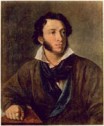Alexander Pushkin

Alexander Sergeyevich Pushkin (Russian: Алекса́ндр Серге́евич Пу́шкин, tr. Aleksandr Sergeyevich Pushkin; IPA: 6 June [O.S. 26 May] 1799 – 10 February [O.S. 29 January] 1837) was a Russian author of the Romantic era who is considered by many to be the greatest Russian poet and the founder of modern Russian literature. Born into the Russian nobility in Moscow, Pushkin published his first poem at the age of fifteen, and was widely recognized by the literary establishment by the time of his graduation from the Tsarskoye Selo Lyceum. While under the strict surveillance of the Tsar's political police and unable to publish, Pushkin wrote his most famous play, the drama Boris Godunov. His novel in verse, Eugene Onegin, was serialized between 1825 and 1832. Notoriously touchy about his honour, Pushkin fought a total of twenty-nine duels, and was fatally wounded in such an encounter with Georges-Charles de Heeckeren d'Anthès. D'Anthès, a French officer serving with the Chevalier Guard Regiment, had been attempting to seduce the poet's wife, Natalya Pushkina. Pushkin's early death at the age of 37 is still regarded as a catastrophe for Russian literature. Pushkin's father Sergei Lvovich Pushkin (1767–1848) descended from a distinguished family of the Russian nobility which traced its ancestry back to the 12th century. Pushkin's mother Nadezhda (Nadja) Ossipovna Gannibal (1775–1836) descended through her paternal grandmother from German and Scandinavian nobility. She was the daughter of Ossip Abramovich Gannibal (1744–1807) and his wife Maria Aleksejevna Pushkina (1745–1818).
 čeština
čeština Deutsch
Deutsch English
English français
français magyar
magyar русский
русский polski
polski Azərbaycan
Azərbaycan беларуская
беларуская italiano
italiano ქართული
ქართული қазақ
қазақ Nederlands
Nederlands português
português slovenčina
slovenčina español
español 中文
中文







